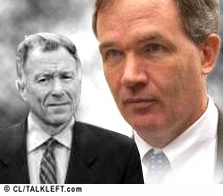Schumer Says Hearing Committee May Call Patrick Fitzgerald

Crooks and Liars reports that Sen. Charles Schumer said on Face the Nation today that the Committee may call Libby prosecutor Patrick Fitzgerald to testify about Bush and Cheney in the context of the Valerie Plame investigation.
If they do, I hope they ask him whether he and Team Libby had any discussions after Libby's conviction about Libby providing information to the Government on Cheney and Bush's role in PlameGate in exchange for the Government's filing of a Rule 35 motion for sentence reduction.
Rule 35 provides in part:
(1) In General. Upon the government's motion made within one year of sentencing, the court may reduce a sentence if:
(A) the defendant, after sentencing, provided substantial assistance in investigating or prosecuting another person;
I can't think of any reason off the top of my head why that information would be privileged. As a federal court in California ruled in a case I cite all the time in discovery motions, almost always with successful results:
More...
| < Lawyer Asks Bush: What About My Client? | Isikoff: Bush Had to Consider Cheney in Libby Commutation > |



